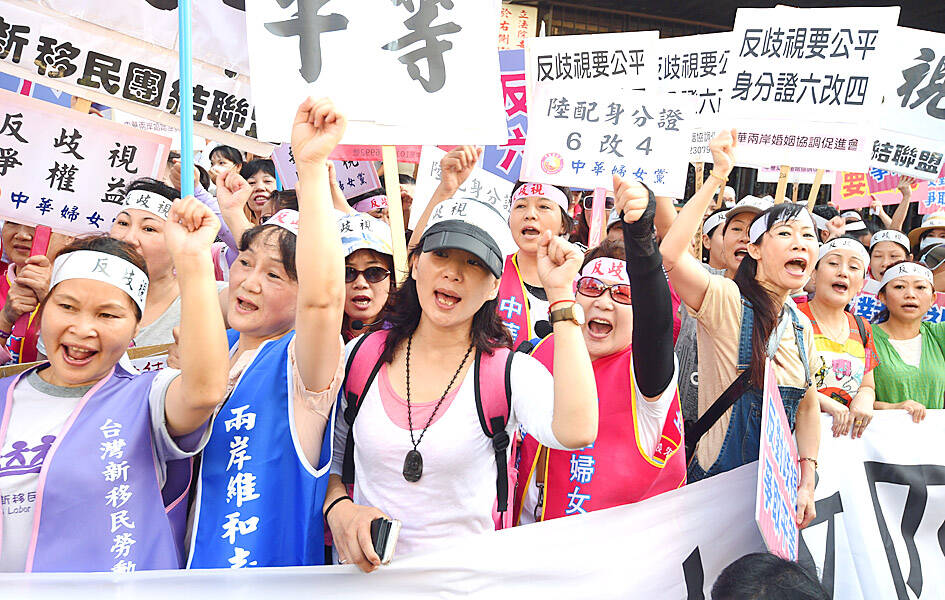An opposition plan to allow Chinese spouses to obtain Republic of China citizenship in a shorter period is “a very serious matter” and would need very careful assessment, due to its potential consequences on national security, government policies and society, Cabinet spokesman Lin Tze-luen (林子倫) said yesterday.
Taiwan People’s Party lawmakers on Wednesday endorsed the plan by Chinese Nationalist Party (KMT) legislators to amend the law to allow Chinese spouses to obtain citizenship after four years of marriage, instead of six years.
“We must take into consideration how it would affect aspects of government policies and the consequences, especially on our national security and the impact on our national interest,” Lin said. “The Cabinet has reservations on reducing the number of years required for Chinese spouses [to obtain citizenship].”

Photo: Lo Pei-de, Taipei Times
“The current requirements have not violated the principle of equality, therefore the Mainland Affairs Council [MAC] and the Executive Yuan have no plans to amend the law,” he said.
“Both sides of the Taiwan Strait are still in a state of hostile confrontation. Therefore we must take into account the nation’s interests and potential security issues, as cross-strait relations are very different from relations with other countries,” he added.
Lin said the proposal must be approached cautiously and be evaluated carefully.
MAC Legal Affairs Department senior executive officer Cheng Cheng-hsin (程政心) said such a change would affect the nation’s population composition and cause an increase in population, as Chinese spouses could bring in their family members and relatives from China to live in Taiwan.
“It would have ramifications on Taiwan’s National Health Insurance program, as it could increase the burden on the healthcare system. An assessment by government agencies and medical professionals is necessary,” Cheng said.
The proposal is opposed by Democratic Progressive Party lawmakers in the legislature.
Medical professionals have started an online petition titled “We oppose the abuse of Taiwanese National Health Insurance system and medical resources,” which calls on lawmakers to suspend the draft amendment proposal.

Taiwan is to have nine extended holidays next year, led by a nine-day Lunar New Year break, the Cabinet announced yesterday. The nine-day Lunar New Year holiday next year matches the length of this year’s holiday, which featured six extended holidays. The increase in extended holidays is due to the Act on the Implementation of Commemorative and Festival Holidays (紀念日及節日實施條例), which was passed early last month with support from the opposition Chinese Nationalist Party (KMT) and Taiwan People’s Party. Under the new act, the day before Lunar New Year’s Eve is also a national holiday, and Labor Day would no longer be limited

Taiwan is to extend its visa-waiver program for Philippine passport holders for another year, starting on Aug. 1, Minister of Foreign Affairs Lin Chia-lung (林佳龍) said on Friday. Lin made the announcement during a reception in Taipei marking the 127th anniversary of Philippine independence and the 50th anniversary of the establishment of the Manila Economic and Cultural Office (MECO) in Taiwan, the Ministry of Foreign Affairs said. The decision reflected Taiwan’s commitment to deepening exchanges with the Philippines, the statement cited Lin as saying, adding that it was a key partner under the New Southbound Policy launched in 2016. Lin also expressed hope

Costa Rica sent a group of intelligence officials to Taiwan for a short-term training program, the first time the Central American country has done so since the countries ended official diplomatic relations in 2007, a Costa Rican media outlet reported last week. Five officials from the Costa Rican Directorate of Intelligence and Security last month spent 23 days in Taipei undergoing a series of training sessions focused on national security, La Nacion reported on Friday, quoting unnamed sources. The Costa Rican government has not confirmed the report. The Chinese embassy in Costa Rica protested the news, saying in a statement issued the same

Temperatures in New Taipei City’s Sindian District (新店) climbed past 37°C yesterday, as the Central Weather Administration (CWA) issued heat alerts for 16 municipalities, warning the public of intense heat expected across Taiwan. The hottest location in Taiwan was in Sindian, where the mercury reached 37.5°C at about 2pm, according to CWA data. Taipei’s Shilin District (士林) recorded a temperature of 37.4°C at noon, Taitung County’s Jinfeng Township (金峰) at 12:50 pm logged a temperature of 37.4°C and Miaoli County’s Toufen Township (頭份) reached 36.7°C at 11:40am, the CWA said. The weather agency yesterday issued a yellow level information notice for Taipei, New